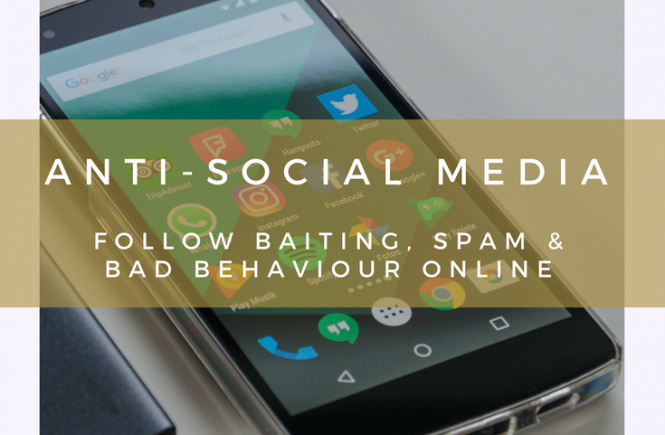Anti-social media: sharp practice and bad behaviour online
Although I’d rather refrain from self-reflexive writing, I thought I’d address something that’s become apparent to me in the last few weeks of navigating the internet.
Recently I’ve been helping a few people, including my husband, to get accustomed to using Instagram and Twitter as a way of promoting their businesses. (See, this is actually about personal finance!)
Lord Balders in particular has been enjoying lots of success and engagement on Instagram, so I’m pleased about that; however, we’ve both been faced with a bit of bad behaviour on that platform.
It’s not abuse or trolling, nor is it actually very upsetting; it is, however, plain annoying. What I’m talking about is called ‘follow baiting’, or ‘bait and switch’: businesses and bloggers tactically vacuuming up followers by following first, then unfollowing a few days after you’ve followed them.
What is social media for?
We’re all on social networks for different reasons: some purely for entertainment and information, others for self-promotion, and others for a mixture of both. Let’s just admit that bloggers and companies are using social media as tools to promote their websites or products. Nothing wrong with that, is there? Of course not. What’s wrong is denying the fact that social media is about engagement, and that there is (or should be) a real person at the other side of every account.
Follow baiting or follow-unfollow
I can easily recognise the signs of follow-baiting, as I run accounts for this blog as well as for my art. The same thing happens: a user with many thousands of followers, who is not following many accounts him/herself, will follow me. If I follow them back, within a few days they will unfollow me
This isn’t the same as someone just changing their mind; it’s well known that it’s a deliberate tactic to increase one’s number of followers whilst keeping a high ratio of followers-to-following, in order to look more popular than they are. I’d describe this as disingenuous and as sharp practice at best.
Actually, that’s being generous: it’s just dishonest.
Social media users like me, who aren’t following millions and also use apps such as Crowdfire, can easily identify and remember people who do this. It only gives me a bad impression of their blog or business, and I won’t bother engaging with them.
Fake followers
Of course, there is also the practice of buying followers. Nearly every article I’ve read on social media says flatly that this is a no-no, yet Instagram and Twitter are awash with accounts trying to sell followers.
People are clearly taking the bait. I recently read one beauty blogger’s post lamenting the plague of fake followers on the blogging world – for this person, it seemed grossly unfair to be ‘competing’ for sponsored posts and advertising with another blogger who has bought followers in order to look like a better investment to brands.
The reason that people buy followers or try to scoop them up with follow-baiting is that influence outranks authenticity… at least for now. It seems that as soon as money becomes involved, ethics escape out of the window, and when bloggers are paid to promote a brand’s product to their audience, they are tempted to inflate their audience to look more appealing.
As for me, I actually enjoy the engagement and seeing how different it is for my blog and my artwork! Still, it’s social media and not marriage – it’s ok to unfollow someone if it’s just not your thing. What’s crucial is the purpose behind your actions, and dishonest practices are much more transparent than many think.
I asked Instagram…
I asked my Instagram followers what their biggest social media put-offs were, and whilst my follow-baiting bugbear didn’t top their list, there was plenty more bad behaviour that they found irritating, and that we can all relate to.
Fake followers are sometimes easy to spot – no pictures, no posts, lots of followers/following. Of course, there are the scantily clad ladies lamenting the amount of fake Twitter accounts out there, who then direct you to Snapchat if you are a real man.
I always block these accounts because I am not, nor have I ever been, a real (or fake) man. Or a mug waiting to be conned. Sometimes they take a bit more to uncover, though: I’ve noticed multiple Twitter accounts (usually fronted by pictures of young people) with identical tweets, usually spewing teenaged platitudes.
Over to you…
Have you noticed this? If so, how do you deal with it? Maybe this hasn’t crossed your path at all. What are your put-offs?




